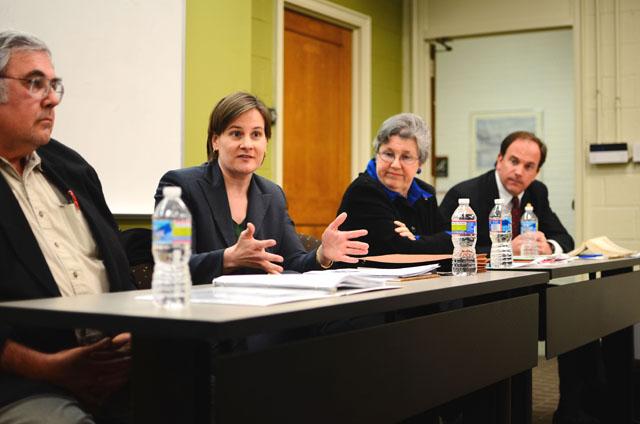FULL DISCLOSURE: Elise Heglar and Alex Sanchez are both members of the Society for Collegiate Journalists. This is a conflict of interest, which violates our Code of Ethics. The Technician regrets the error.
Last year, Americans were astounded to hear about a website called Wikileaks that publicly disclosed previously classified information from government documents.
To mark Sunshine Week, which honors the idea of open government and freedom of information, the University’s Society of Collegiate Journalists held a panel discussion about the controversial website.
The discussion was meant to raise awareness about Sunshine Week and to get some insight from professionals about Wikileaks and how it has affected the world. Robert Kochersberger, an associate professor of English at the University, opened the discussion and moderated the event.
The discussion had four panel members: Joseph Caddell, an assistant professor of history; Ann Sides, who recently retired from the State Department and was a journalist in her former career; Elizabeth Spainhour, who represents media and communication companies and Mike Tadych, a lawyer who has worked on various important free-speech and journalism issues.
Students who attended the discussion were able to submit questions to the panel during the event. The panelists did not have one unified opinion about the effects of Wikileaks. One of the main topics of the discussion was whether or not it was a crime for the site to be created in the first place.
”I do believe what has been done is wrong, by all means,” Sides said.
Although all of the panelists expressed the opinion that Wikileaks may have contained some unethical elements, not all on the panel viewed the organization’s actions as criminal. Another major topic of discussion was whether or not all of the information that Wikileaks puts out can be considered completely authentic, and if it has a real purpose in being released.
“The main question is whether or not this information is something that needs to be out there,” Tadych said.
Wikileaks was continually compared to the release of the Pentagon Papers throughout the discussion. (The New York Times published the Pentagon Papers in the late 1960s. In the top-secret papers, the U.S. Department of Defense laid out its political-military strategy in Vietnam from 1945 to 1967.)
Although the panelists did not feel Wikileaks and the Pentagon Papers were in the same league, they did find some similarities. In both cases, information was released to the public without the government’s full consent. Despite the bad reputation that journalists have been given due to events like this, Caddell said that people do not recognize how much information journalists choose not to reveal.
“There have definitely been times when media outlets knew about things and chose not to release them due to the consequences,” Caddell said.
The panelists also discussed whether or not they considered Wikileaks a threat to the national security of the United States. The general consensus was that although the website posed a delicate situation for the government to deal with, nothing that has been released presents a direct threat to the government or to the public. Caddell said that Wikileaks might have undermined the idea of government secrecy, but presented no real harm to the people of the United States.
“Sometimes people come across information that they feel has to be released, and they should be willing to pay the consequences of releasing that information,” Caddell said.
The panel discussion also provided insight into the importance of Wikileaks, and how it reflects the changing face of journalism. Spainhour said that the definition of a journalist is changing with the advent of whistle-blowing websites such as Wikileaks.
”It is almost impossible to define a journalist today. Anyone with a video camera in the right place can be a journalist now,” Spainhour said.








